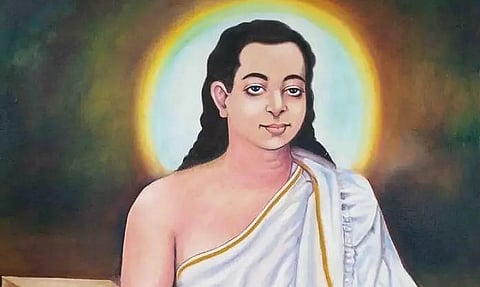
- Home
- Live Blog
- Breaking News
- Top Headlines
- Cities
- NE News
- Sentinel Media
- Sports
- Education
- Jobs

Srimanta Sankaradeva, a towering figure in the history of religious philosophers, established a profound legacy through his philosophy, Eka Sharana Nâma Dharma. His teachings laid the foundation for a new religious philosophy that emphasized the elevation of the individual soul (Jîva) from a state of duality to a non-dual identity with Brahma, the supreme truth. This philosophy is characterized by several key principles that distinguish it from other philosophical paths.
Unity of Brahma and Ishwara: One of the central tenets of Srimanta Sankaradeva’s philosophy is the unity of Brahma (the supreme reality) and Ishwara (God). He boldly proclaimed that Brahma and Ishwara are not separate entities but are, in fact, the same. While Ishwara may be adorned with attributes, both entities are fundamentally unified. This stands in contrast to other branches of Sanâtana Indian philosophy that have not previously taken this stance.
Harmony of Jnâna Mârga and Bhakti Mârga: Srimanta Sankaradeva bridged the gap between the paths of knowledge (Jnâna Mârga) and devotion (Bhakti Mârga), which had remained distinct in Sanâtana Hinduism. He emphasized the importance of both spiritual knowledge and devotion, highlighting their interdependence. His teachings underscored that true knowledge leads to devotion and that genuine devotion is rooted in understanding.
Interplay of Creation and Illusion: Unlike Adi-Sankaracharya, who deemed the creation illusory (Mithyâ), Srimanta Sankaradeva regarded the universe as God’s playground. He saw creation as an integral part of God’s divine plan and not merely an illusion. His philosophy maintained that creation, though temporary, is real and that its purpose is to facilitate the divine play of God. Devotion and Overcoming Mâyâ: Srimanta Sankaradeva emphasized the role of devotion in overcoming Mâyâ (illusion). He advocated devotion to God as a means to transcend the influences of Mâyâ. By holding Lord Hari’s name in the heart and chanting it consistently, one could rise above the illusions of the material world.
Holistic Approach to Life: Srimanta Sankaradeva’s philosophy embraced an integral view of life, accommodating beliefs at various stages of spiritual evolution. He recognized the journey of the individual soul from gross to subtle, from duality to non-duality. His philosophy provided room for all levels of devotees to find resonance and progress.
Vedic Influence on Srimanta Sankaradeva’s Philosophy: Srimanta Sankaradeva’s philosophy drew extensively from the Vedas. He glorified the Vedas and emphasized following their path. His philosophy resonated with the Purusha-sukta of the Rigveda, which extols the omnipresence of the supreme Purusha (Brahma) in all entities. This echoes Srimanta Sankaradeva’s view of the unity of Brahma and Ishwara.
Elevation of Lord Vishnu: Srimanta Sankaradeva’s teachings mirrored the Vedic emphasis on the worship of Lord Vishnu (Vâsudeva). He emphasised the significance of chanting the names of Lord Hari (Krishna), aligning with the Vedic tradition of devotion to Vishnu.
Preserving Vedic Religion: Srimanta Sankaradeva’s Eka Sharana Nâma Dharma upheld the true essence of Vedic religion. He lamented the loss of Vedic devotion and revived the worship of Lord Hari. His philosophy was a beacon of Vedic ideals in a time when the dominance of gama-based practices overshadowed Vedic teachings.
Srimanta Sankaradeva’s philosophy is a remarkable synthesis of various philosophical elements, bridging the gap between duality and non-duality, knowledge and devotion, and creation and illusion. It resonates with the spirit of the Vedas by emphasizing the unity of Brahma and Ishwara and promoting devotion to Lord Vishnu. His teachings serve as a testament to his visionary thinking, integral perspective, and commitment to reviving Vedic values in a transformative way.